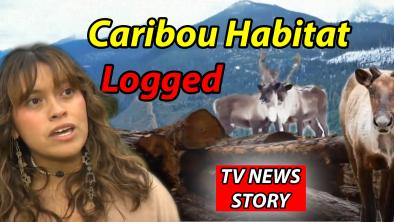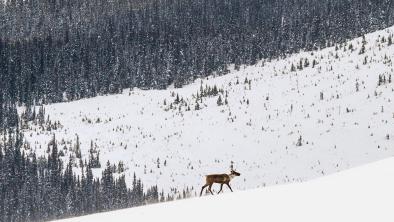Letter to Environment Minister: Urgent action required to ensure the survival and recovery of southern mountain caribou in BC

Sean Nixon and Olivia French
390 - 425 Carrall Street
Vancouver, BC V6B 6E3
Tel: (604) 685-5618
Fax: (604) 685-7813
snixon@ecojustice.ca
ofrench@ecojustice.ca
Sent via e-mail
The Honourable Catherine McKenna
Minister of Environment and Climate Change Canada
Email: ec.ministre-minister.ec@canada.ca
Dear Minister McKenna:
Re: Urgent action required to ensure the survival and recovery of southern mountain caribou in BC
We write to you on behalf of Yellowstone to Yukon Conservation Initiative, the Wilderness Committee, Greenpeace Canada and Wildsight to ask what the federal government plans to do to prevent the extinction of southern mountain caribou in British Columbia and provide for the species’ recovery, as required under the Species at Risk Act.
As you know, in May of 2014 the Committee on the Status of Endangered Wildlife in Canada (COSEWIC) changed its assessment of southern mountain caribou from threatened to endangered. In June of 2018, Environment and Climate Change Canada (“ECCC”) released an Imminent Threat Assessment for Southern Mountain Caribou, noting that you had determined that the species currently face “threats, which are imminent in the sense that immediate
intervention is required to allow for eventual recovery.”
Long-term trends for the species show that 18 of 23 local population units (“LPUs”) are declining, trends for two “may have been considered stable as of 2014,” and trends for the remaining three are unknown.
The condition of southern mountain caribou and its habitat have declined steadily in recent years. All of this increases the urgency of dealing with the root causes of the species’ ongoing decline, including especially the loss or degradation of the habitat necessary for its survival and recovery.
Context: BC’s failure to effectively protect southern mountain caribou and its habitat
As described at a press conference on October 22, 2018, and in related media coverage, BC continues to allow logging and other industrial development in areas identified as critical habitat in the 2014 federal recovery strategy for southern mountain caribou. The Wilderness Committee produced a recent map showing that the BC government approved 83 new logging cutblocks in the critical habitat of eight of the most-endangered southern mountain caribou LPUs (please download a copy of this map from the link below). These same eight LPUs were specifically named in the Imminent Threat Assessment, and include the Quintette, Kinbasket, Narraway, Telkwa, Central Kootenay, Southeast Kootenay, Southwest Kootenay and South Monashee LPUs. Twenty of the approved logging cutblocks are in high or low elevation winter/summer habitat identified in the federal recovery strategy. At least some of the remaining cutblocks, for example in the Quintette LPU, are in relevant matrix habitat that is below the minimum 65% undisturbed threshold (i.e. where disturbance levels are already higher than the 35% maximum set out in the federal recovery strategy).
Environmental groups at the press conference called on BC to issue a moratorium on any further destructive activities in caribou critical habitat until recovery plans in line with federal and provincial duties under SARA have been completed and implemented.
The Honourable Doug Donaldson, BC’s Minister of Forests, Lands, Natural Resource Operations and Rural Development, told media that “There has been logging continuing in areas where caribou are present, but not in critical habitat areas.” What Minister Donaldson presumably meant was that BC does not agree that high and low elevation winter/summer range and matrix ranges are critical habitats for southern mountain caribou, even though these areas were identified by scientists on the federal recovery team as habitat necessary for the survival and recovery of the species.
The province has not otherwise responded to the call for a moratorium on further destruction of caribou critical habitat.
Further, although BC has been developing new legislation to protect at-risk species in the province, the current government’s approach to managing caribou and their habitat has been indistinguishable from that of previous governments who were hostile to the idea of an endangered species law. While we hope that BC’s new law brings in improved approaches to managing species at risk, the ongoing poor management of caribou and its habitat does not inspire confidence that the province will effectively protect the species or its habitat. It is therefore essential that the federal government intervene to ensure the survival and recovery of this species.
Failure to produce any final conservation agreements for the species
ECCC and the BC Ministry of Environment and Climate Change Strategy announced in November of 2017 that they had come up with a draft conservation agreement under section 11 of the Species at Risk Act (“SARA”) regarding recovery measures for southern mountain caribou in British Columbia. The initial focus of the draft conservation agreement was on the Central Group, namely, the Pine, Narraway and Quintette LPUs in Northeastern BC.
We are approaching the one year anniversary of this announcement. ECCC and BC have not yet finalized any SARA conservation agreements for the Central Group or for any other southern mountain caribou in BC.
While there is no deadline in SARA for the federal government to finalize conservation agreements for a species, the situation for southern mountain caribou is dire and calls for (in your words) “immediate intervention.”
Accordingly, you must finalize one or more SARA conservation agreements covering all southern mountain caribou LPUs in BC by the deadlines set out in the conclusion of this letter. These conservation agreements must be produced quickly in conjunction with the applicable First Nations governments and must contain meaningful measures to protect the species’ currently-identified critical habitat and the broader habitat needed for its survival and recovery. Meaningful measures must include a spatially-explicit definition of areas that need strong, effective protection, including – at a minimum – 100% of core habitat and 65% of matrix habitat (further details are set out in the conclusion, below, and in the attached correspondence).
Imminent Threat Assessment and Emergency Order
On May 4, 2018, over six months ago, you publicly announced that southern mountain caribou faces imminent threats to its recovery. In June 2018, you published the Imminent Threat Assessment. You assessed ten LPUs, including the Quintette and Narraway LPUs, concluding that “[t]he species is not protected from anthropogenic threats” and that the “effects of the threats are serious, ongoing, and resulting in continuing declines in most LPUs.” As you noted, the ultimate threat to the recovery of the species is widespread habitat alteration, destruction, and fragmentation. The assessment found that “there is certainty regarding long-term and ongoing declines of caribou and the impact of habitat disturbance on the species.”
Now that you are of the opinion that the species faces imminent threats to its recovery, you have a duty under s. 80(2) of SARA to recommend that Cabinet make an emergency order to protect the species and its habitat. To date, no such recommendation has been made.
At the time the Imminent Threat Assessment was made, your then Parliamentary Secretary Jonathan Wilkinson stated “[t]he level of urgency is high … We can’t kick this problem down the road, which has been the path of government for years.”
The current situation with southern mountain caribou is dire. After years of federal delay under SARA, and in the face of BC’s ongoing failure to protect the species and it habitat, this species needs immediate action to ensure it can survive and recover. Further, the Federal Court has made it clear that a lack of action by the Minister is “particularly egregious” in the context of an emergency order.
It seems clear that the federal government will have little or no leverage in discussions with the provinces about SARA conservation agreements for caribou unless it is willing to use SARA emergency orders or safety-net orders in appropriate circumstances. Our specific requests with respect to your emergency order recommendation and the Governor in Council decision are set out below, in the conclusion.
Critical habitat mapping
The final federal recovery strategy for southern mountain caribou was posted in June of 2014, more than six years after the statutory deadline set out in SARA. That recovery strategy provided only a partial identification of the species’ critical habitat, and promised to complete critical habitat mapping by the end of 2014. Almost four years later, ECCC has not released an updated recovery strategy that fully identifies the critical habitat of southern mountain caribou.
As federal environment minister, you have a duty under s. 41(1)(c) of SARA to include in a recovery strategy for southern mountain caribou an identification of the species’ critical habitat, to the extent possible and based on the best available information. The Federal Courts have confirmed in several judgments that this sub-section of SARA imposes a duty on competent ministers to identify as much critical habitat as possible, in accordance with the best scientific information available at the time. In our view, the current maps of critical habitat in the federal recovery strategy are not a full identification of that habitat to the extent possible and based on the best available information. Further, your duty to identify critical habitat is ongoing – critical habitat maps must be updated as new information comes to light and, generally, on the timeline promised in the original recovery strategy.
ECCC’s ongoing failure to fully identify critical habitat for southern mountain caribou is unlawful. Further, it undermines other initiatives that the federal government is taking or could take under SARA to protect the species’ critical habitat. Ten years have elapsed since the federal government was legally required to identify the species’ critical habitat. We understand that the federal government has already prepared updated critical habitat maps for southern mountain caribou and shared them with BC. Accordingly, we demand that you release an updated recovery strategy including a SARA-compliant identification of southern mountain caribou critical habitat by March 31, 2019, at the latest.
Conclusion
The following actions are required from you, and from the federal government generally, to prevent the extinction and provide for the recovery of southern mountain caribou:
- One or more conservation agreements for the Central Group of southern mountain caribou must be completed by December 31, 2018 (so that this agreement can serve as an appropriate template for other southern mountain caribou LPUs);
- All other conservation agreements for southern mountain caribou must be completed within a year, at most, of your determination that the species faces imminent threats to its recovery (i.e. by May 2019);
- All conservation agreements for southern mountain caribou must contain meaningful measures to protect southern mountain caribou, as set out above and in previous correspondence from Yukon to Yellowstone Conservation Initiative, Greenpeace Canada, Wildsight and others (please see attached letter);
- Until conservation agreements for southern mountain caribou have been completed and implemented, the federal government must require BC to bring an immediate halt to destructive activities in core habitat (whether or not already identified in the 2014 recovery strategy) and in matrix habitat that exceeds the 35% maximum disturbance level;
- Unless meaningful conservation agreements for all southern mountain caribou LPUs in BC are completed by the deadlines set out above, the Governor in Council must make an emergency order for southern mountain caribou by May 2019;
- ECCC must release an updated recovery strategy for southern mountain caribou with a SARA-compliant identification of critical habitat by March 31, 2019, at the latest.
In particular, the federal government needs to apply significant pressure to BC to finalize meaningful conservation agreements promptly. This would help soften the effects of the federal government’s ongoing failures under other provisions of SARA (most particularly, the duty to fully identify the species’ critical habitat, and your duty to recommend an emergency order following the Imminent Threat Assessment).
The federal government must act with urgency to ensure this iconic species does not become extirpated or extinct under your watch. We would be happy to meet with you to discuss this letter and any related issues.
Sean Nixon Barrister & Solicitor
Olivia French Barrister & Solicitor


